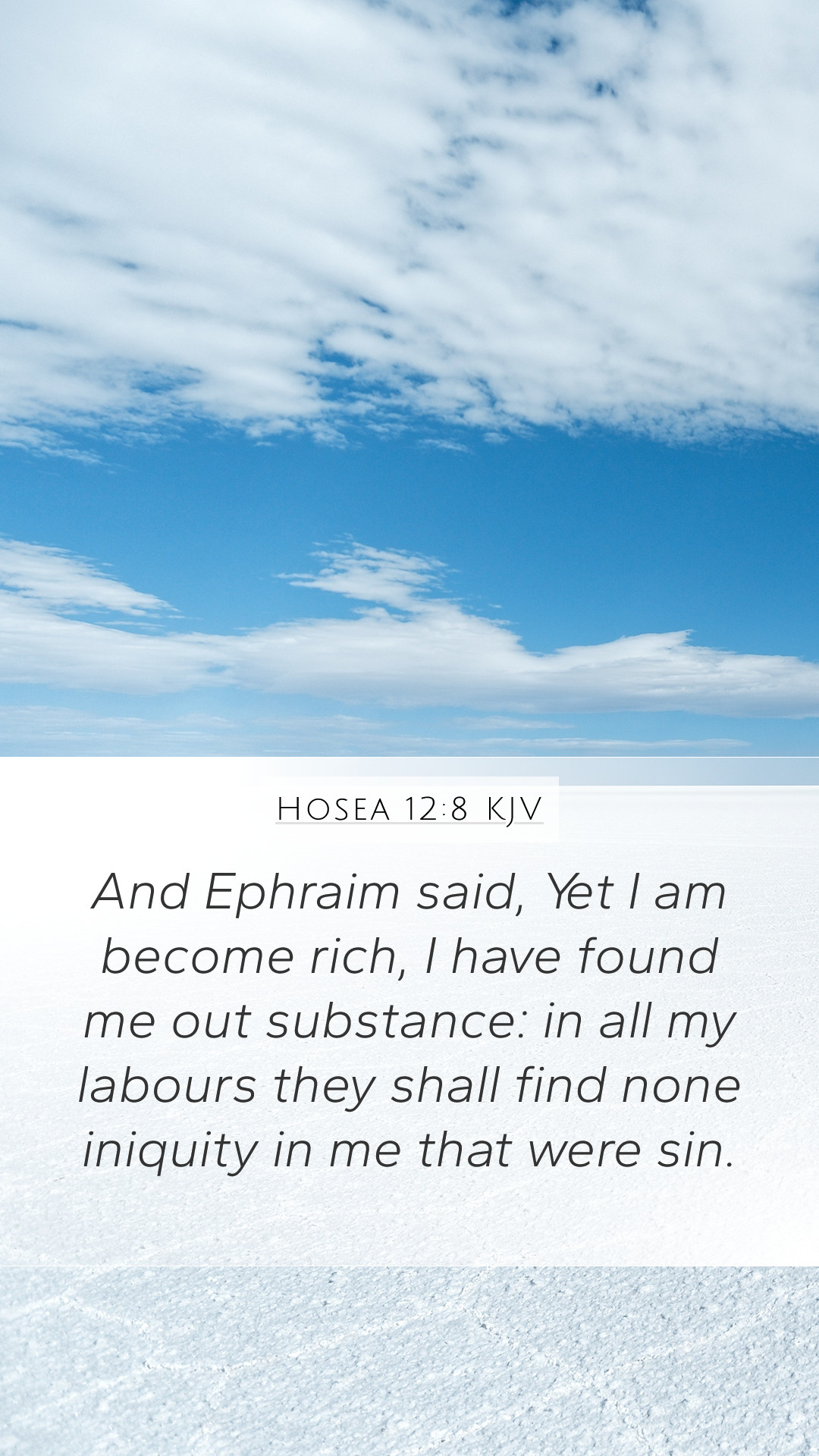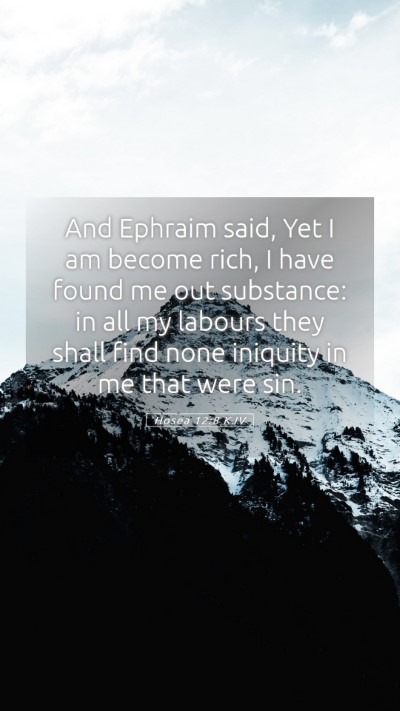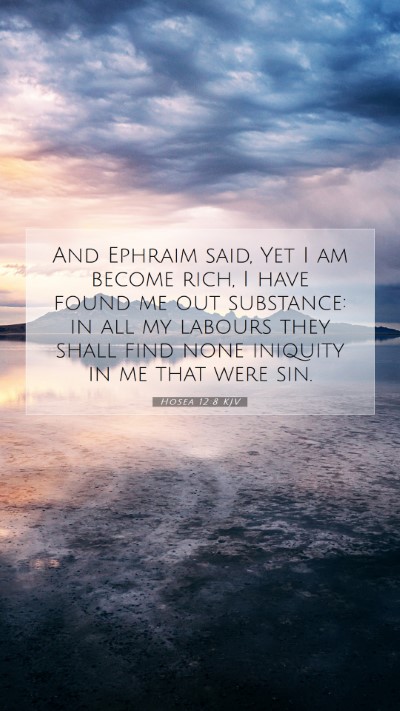Old Testament
Genesis Exodus Leviticus Numbers Deuteronomy Joshua Judges Ruth 1 Samuel 2 Samuel 1 Kings 2 Kings 1 Chronicles 2 Chronicles Ezra Nehemiah Esther Job Psalms Proverbs Ecclesiastes Song of Solomon Isaiah Jeremiah Lamentations Ezekiel Daniel Hosea Joel Amos Obadiah Jonah Micah Nahum Habakkuk Zephaniah Haggai Zechariah MalachiHosea 12:8 Meaning
What is the meaning of Hosea 12:8?
And Ephraim said, Yet I am become rich, I have found me out substance: in all my labours they shall find none iniquity in me that were sin.
Hosea 12:8 Bible Verse Meaning
Bible Verse Meaning: Hosea 12:8
Hosea 12:8 states, “Ephraim has said, ‘Surely I am rich, I have found wealth for myself; in all my labors they shall find in me no iniquity that would be sin.’” This verse expresses the self-sufficiency and pride of the people of Ephraim, showcasing their reliance on their wealth and achievements rather than their dependence on God.
Bible Verse Interpretations
Understanding this verse requires looking into the themes of self-reliance and arrogance. Ephraim illustrates a dangerous mindset that society often adopts: the belief that material success absolves one of spiritual failing. Consider the insights provided by various biblical commentators.
-
Matthew Henry:
Henry emphasizes the folly of relying on wealth without recognizing God’s providence. He points out that Ephraim is blind to the iniquity inherent in their pride and self-reliance. Their declaration of riches becomes a smokescreen for their spiritual bankruptcy.
-
Albert Barnes:
Barnes underscores that Ephraim’s assertion of wealth reflects a sense of security and comfort derived from their possessions. He notes that this perceived prosperity leads to moral complacency, obscuring the truth of their sinful state before God.
-
Adam Clarke:
Clarke interprets the verse as a representation of Israel’s delusion. He argues that while they claim to be righteous by their works, all their labors amount to nothing in the sight of God. Their lack of awareness about their sins reveals a dire spiritual condition.
Understanding Scripture: Themes and Applications
This passage speaks powerfully to modern readers, reflecting the tendency to equate material success with spiritual integrity. Below are key themes and applications drawn from the commentary:
-
Self-Sufficiency vs. Dependence on God:
Ephraim's confidence is misplaced, highlighting the importance of recognizing our need for divine support rather than relying solely on personal achievements.
-
The Danger of Complacency:
Wealth can blind individuals to their spiritual condition, making them resistant to humility and repentance.
-
True Wealth:
Spiritual wealth is far more valuable than material gain. Believers are encouraged to seek first the Kingdom of God rather than their material success, emphasizing the lasting treasures of faith over transient earthly wealth.
In-Depth Bible Verse Analysis
To truly grasp the meaning of Bible verses, one must consider the historical context of Hosea’s message. The context of Israel during Hosea's time was marked by moral decay and spiritual idolatry, which made the wealthy feel secure in their sinful lives.
As part of Bible study groups or in online Bible study, this verse could lead to discussions on the reflection of personal values in wealth and the misconceptions surrounding financial success. One might ask: “What does Hosea 12:8 mean for today's culture?”
Significance and Cross References
Understanding Hosea 12:8 not only involves examining the verse itself but also exploring its significance. It serves as a warning against placing too much value on material possessions:
- Luke 12:15 - “Take heed and beware of covetousness, for one’s life does not consist in the abundance of the things he possesses.”
- Proverbs 11:28 - “He who trusts in his riches will fall, but the righteous will flourish like foliage.”
- James 1:10-11 - “But the rich, in his humiliation, because as a flower of the field he will pass away.”
Bible Verse Commentary Summary
The rich and prosperous often overlook the spiritual implications of their wealth, believing that their prosperity equates to righteousness. Biblical exegesis of Hosea 12:8 reveals that every believer must assess the true value of their life in light of God's standards.
Applying Bible Verses to Daily Life
This verse can challenge believers to evaluate their priorities continually. Are they depending on God's provision, or do they find solace in their material gains? The focus should be on 'understanding Scripture' in the context of developing a life that pleases God, punctuated not by wealth but by faithfulness and humility.
In summary, Hosea 12:8 serves as a critical reminder to seek deeper Bible study insights and to cultivate a rich spiritual life that holds eternal significance compared to the fleeting nature of worldly possessions.


